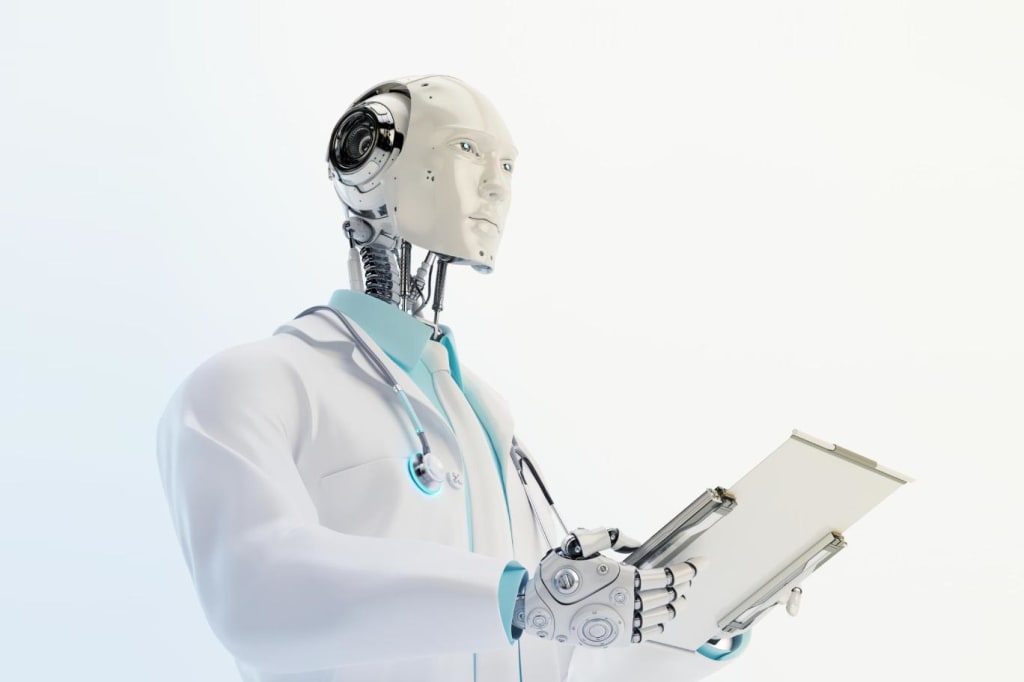How artificial intelligence affects the health sector ?
what artificial intelligence can do in the field of health in the future

Artificial intelligence (AI) has the potential to revolutionize the health sector in a number of ways, including:
1. Medical Diagnosis: AI can help doctors and healthcare professionals diagnose medical conditions more accurately and quickly by analyzing large amounts of patient data and identifying patterns that may not be immediately apparent to humans.
Artificial intelligence (AI) can significantly impact medical diagnosis by providing more accurate and timely diagnoses. AI algorithms can process and analyze vast amounts of medical data, including patient history, symptoms, and medical imaging, to identify patterns and predict potential health conditions. Here are some ways AI can assist with medical diagnosis:
1-1. Faster Diagnosis: AI can analyze data faster than a human physician and can make a diagnosis in real-time. This can lead to faster diagnosis and treatment, which can be critical in situations where time is of the essence.
1-2. Improved Accuracy: AI algorithms can analyze medical data with a high level of accuracy and can identify patterns that may not be immediately apparent to human physicians. This can lead to more accurate diagnoses and reduced instances of misdiagnosis.
1-3. Personalized Diagnosis: AI can analyze patient data such as genetics, lifestyle, and medical history, to provide personalized diagnoses that take into account individual factors that may be missed by human physicians.
1-4. Predictive Diagnosis: AI can predict potential health conditions based on data analysis, leading to proactive treatment and management of diseases before they progress.
2. Personalized Treatment: AI can help personalize treatments based on a patient's unique health data, genetics, and lifestyle factors. This can lead to more effective treatments and better patient outcomes.
Artificial intelligence (AI) can significantly impact personalized treatment by analyzing vast amounts of patient data and providing insights that can help tailor treatments to individual patients. Here are some ways AI can assist with personalized treatment:
2-1. Analyzing Patient Data: AI can analyze patient data such as medical history, lifestyle factors, and genetics to identify patterns and provide insights into potential treatment options.
2-2. Recommending Treatments: Based on patient data analysis, AI can recommend specific treatments that are personalized to the patient's needs and preferences.
2-3. Predicting Treatment Outcomes: AI can predict the outcomes of different treatment options based on patient data and medical history, allowing healthcare professionals to make more informed treatment decisions.
2-4. Monitoring Treatment Progress: AI can monitor patient progress throughout treatment and adjust the treatment plan as needed based on real-time data analysis.
2-5. Precision Medicine: AI can assist in the development of precision medicine, which involves tailoring treatment to individual patients based on their unique genetic makeup and other factors.
3. Drug Development: AI can help accelerate the drug development process by analyzing vast amounts of data to identify potential drug targets and predicting how a drug will interact with the body.
Artificial intelligence (AI) can significantly impact drug development by accelerating the process and improving the success rate of developing new drugs. Here are some ways AI can assist with drug development:
3-1. Identifying Drug Targets: AI can analyze large amounts of data to identify potential drug targets, which are specific molecules or proteins that can be targeted by drugs to treat diseases.
3-2. Predicting Drug Efficacy: AI can predict how drugs will interact with the body and how effective they are likely to be based on data analysis, which can save time and resources in the drug development process.
3-3. Optimizing Clinical Trials: AI can assist in designing and optimizing clinical trials by analyzing patient data and identifying specific patient populations that are most likely to benefit from the drug being developed.
3-4. Repurposing Existing Drugs: AI can analyze data to identify potential new uses for existing drugs, which can save time and resources in the drug development process.
3-5. Improving Drug Safety: AI can assist in predicting potential side effects and drug interactions, leading to the development of safer drugs.
4. Administrative Tasks: AI can help automate administrative tasks such as scheduling appointments, managing medical records, and processing insurance claims, which can free up healthcare professionals to focus on patient care.
Artificial intelligence (AI) can significantly impact administrative tasks in hospitals by automating repetitive tasks and streamlining processes, which can free up healthcare professionals to focus on patient care. Here are some ways AI can assist with administrative tasks:
4-1. Scheduling: AI can assist in scheduling appointments and procedures, reducing wait times and improving patient satisfaction.
4-2. Billing and Insurance: AI can assist in processing billing and insurance claims, reducing errors and speeding up reimbursement times.
4-3. Medical Record Management: AI can assist in managing and organizing electronic medical records, allowing for faster and more efficient access to patient information.
4-4.Inventory Management: AI can assist in managing hospital inventory, ensuring that supplies and equipment are in stock and reducing waste.
4-5. Chatbots: AI-powered chatbots can assist patients with common questions and concerns, freeing up healthcare professionals to focus on more complex cases.
5. Medical Imaging: AI can help analyze medical images such as X-rays, CT scans, and MRIs, and assist radiologists in detecting and diagnosing conditions such as cancer, heart disease, and neurological disorders.
Artificial intelligence (AI) can significantly impact medical imaging by improving the accuracy and speed of image analysis, leading to more accurate diagnoses and better patient outcomes. Here are some ways AI can assist with medical imaging:
5-1. Image Analysis: AI can analyze medical images such as X-rays, CT scans, and MRIs with a high level of accuracy, identifying patterns and anomalies that may be missed by human radiologists.
5-2. Diagnoses: AI can assist in making diagnoses based on medical images, leading to faster and more accurate diagnoses, which can be critical in situations where time is of the essence.
5-3. Treatment Planning: AI can assist in treatment planning by analyzing medical images to identify the most effective treatment options and predicting potential treatment outcomes.
5-4. Quality Control: AI can assist in quality control by analyzing medical images to ensure that they meet certain standards for quality and accuracy.
5-5. Data Analysis: AI can analyze large amounts of medical imaging data, identifying patterns and trends that can inform research and clinical decision-making.
Overall, AI has the potential to greatly improve the efficiency, accuracy, and effectiveness of healthcare, ultimately leading to better patient outcomes and improved quality of life.
About the Creator
Enjoyed the story? Support the Creator.
Subscribe for free to receive all their stories in your feed. You could also pledge your support or give them a one-off tip, letting them know you appreciate their work.





Comments
There are no comments for this story
Be the first to respond and start the conversation.